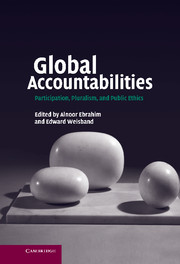Book contents
- Frontmatter
- Contents
- List of tables
- List of figures
- Acknowledgments
- List of contributors
- 1 Introduction: forging global accountabilities
- Part I Public accountability: participatory spheres from global to local
- Part II Experiments in forging NGO accountability: mutuality and context
- Part III Reflective accountability: new directions for participatory practices
- Part IV Global accountability frameworks and corporate social responsibility
- 11 Financial actors and instruments in the construction of global corporate social responsibility
- 12 Public accountability within transnational supply chains: a global agenda for empowering Southern workers?
- 13 Tripartite multilateralism: why corporate social responsibility is not accountability
- 14 Conclusion: prolegomena to a postmodern public ethics: images of accountability in global frames
- Index
- References
13 - Tripartite multilateralism: why corporate social responsibility is not accountability
Published online by Cambridge University Press: 22 September 2009
- Frontmatter
- Contents
- List of tables
- List of figures
- Acknowledgments
- List of contributors
- 1 Introduction: forging global accountabilities
- Part I Public accountability: participatory spheres from global to local
- Part II Experiments in forging NGO accountability: mutuality and context
- Part III Reflective accountability: new directions for participatory practices
- Part IV Global accountability frameworks and corporate social responsibility
- 11 Financial actors and instruments in the construction of global corporate social responsibility
- 12 Public accountability within transnational supply chains: a global agenda for empowering Southern workers?
- 13 Tripartite multilateralism: why corporate social responsibility is not accountability
- 14 Conclusion: prolegomena to a postmodern public ethics: images of accountability in global frames
- Index
- References
Summary
Multilateralism and global accountabilities
Multilateral institutions and regimes operate in a world politically dominated by sovereign nation-states. On the other hand, transnational capital, multinational business enterprises, and international markets generate diverse effects that intrude on national societies in a wide variety of ways, from unprecedented wealth to unconscionable poverty, from growth and prosperity to atrophy and marginalization. Together, these and similar anomalies produced across the global fault-lines of wealth and power, have stimulated renewed emphasis on global accountabilities as a means of collective action to counter a broad array of problems, from political violence and economic injustice to social disintegration and environmental degradation. As we have seen throughout this volume, global accountabilities provide relief but no panacea. They carry costs and they create their own tensions and contradictions, even as they supply the elements necessary for effective governance.
Such is the case when one begins to examine the relationship between global accountabilities and multilateralism, in particular the role and effectiveness of multilateral institutions and regimes, intergovernmental organizations (IGOs), transnational business enterprises, and civil society organizations (CSOs) or nongovernmental organizations (NGOs) that function across borders. Multilateralism might well be perceived as an indispensable factor in managing global affairs and in promoting global accountabilities. Instead, multilateral institution-building, particularly the development of reporting and monitoring procedures and of regulatory mechanisms on behalf of institutional accountability, provokes skepticism and, in many instances, outright hostility.
- Type
- Chapter
- Information
- Global AccountabilitiesParticipation, Pluralism, and Public Ethics, pp. 280 - 306Publisher: Cambridge University PressPrint publication year: 2007

